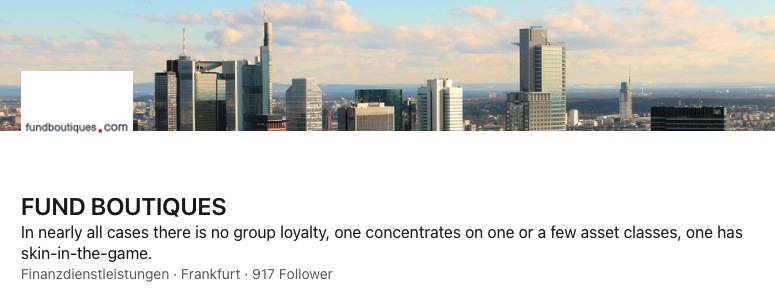“Be courteous to all, but friendly with a few, and let those few prove themselves before you put your trust in them.” (George Washington). Family offices, art investments, asset management, trusted advisors, courses of study, and more – Markus Hill spoke for FONDSBOUTIQUEN.DE with Dr. Maximilian A. Werkmüller, LL.M., Professor of Finance and Family Office Management, Allensbach Hochschule, about the job description of the family office and the special challenges and trends in this segment. In addition to differentiating the special field of family office from classic private wealth management, the conference will also address topics such as “single-family office versus multi-family office,” digitalization, asset allocation, legal advice, and the importance of family-managed companies.
Hill: How did the idea for the Family Office Management course come about?
Werkmüller: I had been a lecturer in foundation and tax law and tax-optimized asset succession at the EBS Finance Academy since 2000. It became apparent early on that the topics of holistic wealth planning were very popular with postgraduates, i.e. with those undergoing in-service training, at least at that time. At the latest since the subprime crisis in 2008 and the years that followed, it was clear that students’ interest in traditional banking had waned and that the topic of family offices, in particular, was increasingly becoming the focus of interest. However, the idea of turning this into a subject and offering it as part of a master’s degree program only came about in cooperation with Allensbach University. In this respect, we can claim to be a pioneer in a field that is only gradually becoming accessible to students in initial academic training. It is undisputed that the family office has now established itself within the framework of the recognized advisory professions. The number of multi and single-family offices has also been rising steadily for years. This also results in interesting job prospects for career starters. We are a little proud that we, at Allensbach University, can make a valuable contribution to getting young people interested in this profession and motivating them to start their careers.
Hill: Which area in the course is currently attracting increased interest?
Werkmüller: The subject of family office management is very multifaceted and therefore offers good opportunities to set your focus. Since most of my students come from traditional business management backgrounds, the focus is still on capital market-oriented topics. Numerous bachelor’s and master’s theses are dedicated to this subject area. However, I consider it my task as the responsible faculty member to ensure that this scope is broadened and extends to those areas that are not so much the focus of academic research. These include in particular the illiquid asset classes, such as real estate, private equity, or even investments in art objects or the art market. In particular, our last publication on the topic of art and art investments in the context of total asset allocation has generated a lot of interest in the social networks. We were also able to contribute an excellent master’s thesis in which one of our students dealt with the question of whether and to what extent the principles of portfolio theory apply to investments in works of art. For family offices, in particular, such questions and especially the answers to them are of great value. Numerous wealthy families have invested at least part of their assets in works of art for generations. The performance measurement of such collections is a topic that has not yet been conclusively discussed academically.

Hill: How do you distinguish the family office segment from the private wealth management segment?
Werkmüller: We recently published a blog article on this question as well. The distinction lies in particular in the different perspectives that a family office and a private wealth manager take. While a family office, as a trusted advisor, exclusively represents the interests of its principals and does not pursue any asset interests of its own beyond its remuneration, a wealth manager, who is employed by a bank, for example, may also sell his house products to the client without any further problems. In this capacity, he does not necessarily have to act as a “trusted advisor”, but may and must also legitimately pursue the profit-oriented interests of his employer. At this point, I deliberately do not mean this in a derogatory way. It is just a completely different starting point. Clients who entrust themselves to the private wealth management of a bank are not looking for a family office, and vice versa.
Hill: Are there any current trends in the family office sector that you are aware of?
Werkmüller: To answer this question, we have to distinguish between single and multi-family offices. The topic of impact investing is clearly on the rise among single-family offices. Another trend, which was largely caused or reinforced by the Covid 19 pandemic, is the digitalization of services. While multi-family offices have traditionally been better positioned in this area due to the existing competition, and in some cases still are, single-family offices sometimes have a lot of catching up to do, depending on the stage of development the office is at. Concerning investment locations, it can be seen that the continent of Africa has now also become the focus of family offices. More and more, families are investing part of their assets in East African countries. They do this not only to generate an appropriate return but also to make an effective investment in improving the local infrastructure. Otherwise, private equity investments are still the focus of the offices, regardless of whether they are single or multi-family offices. The topic of “NextGen” is currently occupying numerous families who have set up their own office. The reason for this lies in the fact that many entrepreneurial families have completed the generational change and the younger generation naturally has different demands on the services of the office than the generation of the transferors and/or company founders. Numerous service providers have already adapted to this change in demand and some cases are offering extracts of their services specifically tailored to this demand.
Hill: What topics are you currently dealing with in addition to your work at the university?
Werkmüller: My main job has always been as a lawyer. And there I come from the “inheritance law corner”, i.e., the topics of inheritance, gifts, and endowments, and this preferably in a tax-optimized form, was and still is my actual field of activity. In this specialist function, I have always been involved in the structural issues of large family estates. From there I have been able to develop my family office profile. Apart from teaching at Allensbach University and working as a consultant for Peter May, I work as an independent lawyer for a Düsseldorf business law firm and also have an office at a Swiss law firm in Zurich, from where I serve my international clients. As the founder and shareholder of a LegalTech company, I keep a very close eye on the market for digital legal services. There will be a lot happening here in the coming months. Here, too, the Covid 19 pandemic has given cause to critically review business models that have been cultivated for years or decades.
Hill: The world is not just family offices – what are you reading outside the box at the moment?
Werkmüller: That’s a very difficult question. Particularly if you’re in the family office business, you very often have to think outside the box, or rather you have to do so to identify trends as early as possible and tailor your services accordingly. But life is not all about family offices – nor is mine, of course. Overall, it can be said that family-run companies, in particular, are coming through this pandemic comparatively well. Of course, some industries are suffering unduly under the current circumstances, for example, breweries. But fundamentally, the owner-centered business models have proven to be crisis-proof and viable even in these times. After the end of this pandemic, there will certainly be ample opportunity to take stock of what could have been done better or differently in the past. This is likely to be particularly true of the actions of the governmental agencies. What is important, however, is that the changes are taking place at all, and this is, if I may put it that way, an almost pleasant side effect of the overall very difficult circumstances in which we all find ourselves at present. What will the world look like after Covid-19? I firmly believe that we will not return “1:1” to the old life we led until March of last year. From a significantly increased sensitivity to climate and environmental concerns to a complete reprogramming of digital services, the world will be a completely different place after this pandemic ends. We may all live more consciously and pay more attention to our surroundings in everything we do. Furthermore, I firmly believe that we will continue to use video conferencing in the future. It’s not a bad way to overcome greater distances and exchange ideas very efficiently. Of course, the format is not suitable for everything, especially not for difficult topics; however, it will probably be indispensable for normal business processes in the future. It also saves costs. I would therefore venture a cautiously positive outlook for the fall of 2021 and look forward to summer vacation in 2022.
Hill: Thank you very much for the interview.
Dr. Maximilian A. Werkmüller, LL.M., is a Professor of Finance and Family Office Management at Allensbach University in Constance. He advises in particular medium-sized family businesses and entrepreneurs on all aspects of “private finance” and is the author and director of numerous academic publications and seminars on the subject areas for which he is responsible.
Allensbach University: www.allensbach-hochschule.de
“Art investments as an alternative asset class in family office management – How sustainable do art investments prove to be and how can investments in art be compared to classical investments? Can it be done at all? Within the framework of the Master Finance (M.A.) at the Allensbach University of Applied Sciences, one can get to know, deepen and study the principles of investments in art and their effects on overall wealth. (Prof. Dr. Maximilian A. Werkmüller, Professor of Finance and Family Office Management at Allensbach University): https://www.allensbach-hochschule.de/kunst-investments/
“Family Office Management vs. Private Wealth Management” – It is often asked how exactly Family Office Management (FOM) differs from Private Wealth Management (PWM). Indeed, both look – from the outside – very similar. On closer inspection, however, there are fundamental differences, which will be briefly explained below. (Prof. Dr. Maximilian A. Werkmüller, Professor of Finance and Family Office Management at Allensbach University): https://www.allensbach-hochschule.de/family-office-management-vs-private-wealth-management/

- Family Offices, Hedge Funds, CAT Bonds & Subordinated Bonds & Portfolio Manager Due Diligence – EVENT NOTE (Interview – Daniel Grieger, Plenum Investments AG)
- Family offices, fund initiators, and the “burning passion” factor (Interview – Markus Hill, Thomas Caduff)
- ESG, Family Offices, Real Estate, Blockchain, AIFM – Liechtenstein, Switzerland & “Win-win Factor” (Interview – David Gamper, LAFV Liechtenstein Investment Fund Association)

4 thoughts on “FAMILY OFFICES: “Family Office Management vs. Private Wealth Management”, Asset Management, Trusted Advisor, Art, Mittelstand & Digitalization (Interview – Dr. Maximilian A. Werkmüller, LL.M., Professor of Finance and Family Office Management – Allensbach University)”